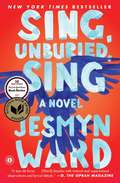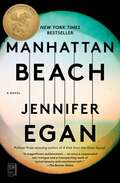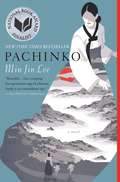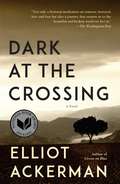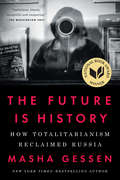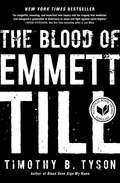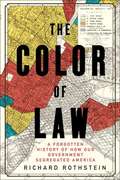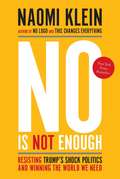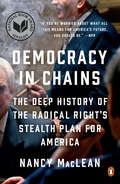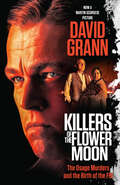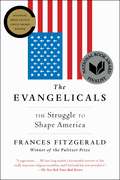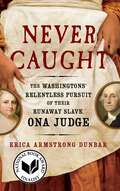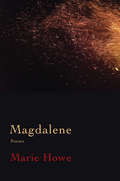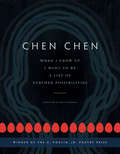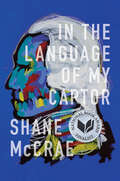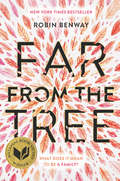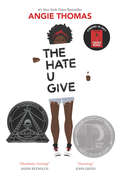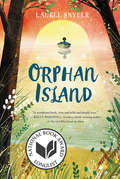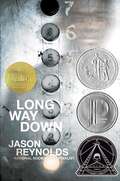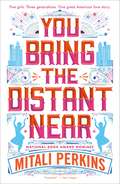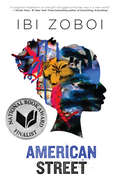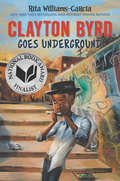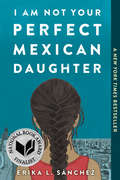Special Collections
National Book Awards 2017
Description: A selection of longlist titles, finalists and winners of the 2017 National Book Awards that are currently live in Bookshare's general collection. Categories include Fiction, Nonfiction, Poetry, and Young People's Literature. #award
- Table View
- List View
Sing, Unburied, Sing
by Jesmyn WardA searing and profound Southern odyssey by National Book Award winner Jesmyn Ward.
In Jesmyn Ward’s first novel since her National Book Award–winning Salvage the Bones, this singular American writer brings the archetypal road novel into rural twenty-first-century America. Drawing on Morrison and Faulkner, The Odyssey and the Old Testament, Ward gives us an epochal story, a journey through Mississippi’s past and present that is both an intimate portrait of a family and an epic tale of hope and struggle. Ward is a major American writer, multiply awarded and universally lauded, and in Sing, Unburied, Sing she is at the height of her powers.
Jojo and his toddler sister, Kayla, live with their grandparents, Mam and Pop, and the occasional presence of their drug-addicted mother, Leonie, on a farm on the Gulf Coast of Mississippi. Leonie is simultaneously tormented and comforted by visions of her dead brother, which only come to her when she’s high; Mam is dying of cancer; and quiet, steady Pop tries to run the household and teach Jojo how to be a man. When the white father of Leonie’s children is released from prison, she packs her kids and a friend into her car and sets out across the state for Parchman farm, the Mississippi State Penitentiary, on a journey rife with danger and promise.
Sing, Unburied, Sing grapples with the ugly truths at the heart of the American story and the power, and limitations, of the bonds of family. Rich with Ward’s distinctive, musical language, Sing, Unburied, Sing is a majestic new work and an essential contribution to American literature.
Manhattan Beach
by Jennifer EganElleAnna Kerrigan, nearly twelve years old, accompanies her father to visit Dexter Styles, a man who, she gleans, is crucial to the survival of her father and her family. She is mesmerized by the sea beyond the house and by some charged mystery between the two men.
Years later, her father has disappeared and the country is at war. Anna works at the Brooklyn Naval Yard, where women are allowed to hold jobs that once belonged to men, now soldiers abroad. She becomes the first female diver, the most dangerous and exclusive of occupations, repairing the ships that will help America win the war.
One evening at a nightclub, she meets Dexter Styles again, and begins to understand the complexity of her father’s life, the reasons he might have vanished.
With the atmosphere of a noir thriller, Egan’s first historical novel follows Anna and Styles into a world populated by gangsters, sailors, divers, bankers, and union men.
Manhattan Beach is a deft, dazzling, propulsive exploration of a transformative moment in the lives and identities of women and men, of America and the world. It is a magnificent novel by the author of A Visit from the Goon Squad, one of the great writers of our time.
Winner of the 2018 Andrew Carnegie Medal for Fiction
A New York Times Bestseller
Pachinko
by Min Jin LeeA new tour de force from the bestselling author of Free Food for Millionaires, for readers of A Fine Balance and Cutting for Stone.
Profoundly moving and gracefully told, Pachinko follows one Korean family through the generations, beginning in early 1900s Korea with Sunja, the prized daughter of a poor yet proud family, whose unplanned pregnancy threatens to shame them. Betrayed by her wealthy lover, Sunja finds unexpected salvation when a young tubercular minister offers to marry her and bring her to Japan to start a new life. So begins a sweeping saga of exceptional people in exile from a homeland they never knew and caught in the indifferent arc of history.
In Japan, Sunja's family members endure harsh discrimination, catastrophes, and poverty, yet they also encounter great joy as they pursue their passions and rise to meet the challenges this new home presents. Through desperate struggles and hard-won triumphs, they are bound together by deep roots as their family faces enduring questions of faith, family, and identity.
A New York Times Bestseller
Dark at the Crossing
by Elliot AckermanFrom the author of the acclaimed Green on Blue, a timely new novel of stunning humanity and tension: a contemporary love story set on the Turkish border with Syria. Haris Abadi is a man in search of a cause. An Arab American with a conflicted past, he is now in Turkey, attempting to cross into Syria and join the fight against Bashar al-Assad's regime. But he is robbed before he can make it, and is taken in by Amir, a charismatic Syrian refugee and former revolutionary, and Amir's wife, Daphne, a sophisticated beauty haunted by grief. As it becomes clear that Daphne is also desperate to return to Syria, Haris's choices become ever more wrenching: Whose side is he really on? Is he a true radical or simply an idealist? And will he be able to bring meaning to a life of increasing frustration and helplessness? Told with compassion and a deft hand, Dark at the Crossing is an exploration of loss, of second chances, and of why we choose to believe--a trenchantly observed novel of raw urgency and power.
The Future Is History
by Masha GessenLonglisted for the 2017 National Book Award in NonfictionPutin’s bestselling biographer reveals how, in the space of a generation, Russia surrendered to a more virulent and invincible new strain of autocracy. Hailed for her “fearless indictment of the most powerful man in Russia” (The Wall Street Journal), award-winning journalist Masha Gessen is unparalleled in her understanding of the events and forces that have wracked her native country in recent times. In The Future Is History, she follows the lives of four people born at what promised to be the dawn of democracy. Each of them came of age with unprecedented expectations, some as the children and grandchildren of the very architects of the new Russia, each with newfound aspirations of their own—as entrepreneurs, activists, thinkers, and writers, sexual and social beings. Gessen charts their paths against the machinations of the regime that would crush them all, and against the war it waged on understanding itself, which ensured the unobstructed reemergence of the old Soviet order in the form of today’s terrifying and seemingly unstoppable mafia state. Powerful and urgent, The Future Is History is a cautionary tale for our time and for all time.
The Blood of Emmett Till
by Timothy B. TysonIn 2014, protesters ringed the White House, chanting, “How many black kids will you kill? Michael Brown, Emmett Till!” Why did demonstrators invoke the name of a black boy murdered six decades before?
In 1955, white men in the Mississippi Delta lynched a fourteen-year-old from Chicago named Emmett Till. His murder was part of a wave of white terrorism in the wake of the 1954 Supreme Court decision that declared public school segregation unconstitutional. The national coalition organized to protest the Till lynching became the foundation of the modern civil rights movement. Only weeks later, Rosa Parks thought about young Emmett as she refused to move to the back of a city bus in Montgomery, Alabama. Five years later, the Emmett Till generation, forever marked by the vicious killing of a boy their own age, launched sit-in campaigns that turned the struggle into a mass movement. “I can hear the blood of Emmett Till as it calls from the ground,” shouted a black preacher in Albany, Georgia. But what actually happened to Emmett Till—not the icon of injustice but the flesh-and-blood boy?
Part detective story, part political history, Timothy Tyson’s The Blood of Emmett Till draws on a wealth of new evidence, including the only interview ever given by Carolyn Bryant, the white woman in whose name Till was killed. Tyson’s gripping narrative upends what we thought we knew about the most notorious racial crime in American history.
The Color Of Law
by Richard RothsteinIn this groundbreaking history of the modern American metropolis, Richard Rothstein, a leading authority on housing policy, explodes the myth that America's cities came to be racially divided through de facto segregation--that is, through individual prejudices, income differences, or the actions of private institutions like banks and real estate agencies. Rather, The Color of Law incontrovertibly makes clear that it was de jure segregation--the laws and policy decisions passed by local, state, and federal governments--that actually promoted the discriminatory patterns that continue to this day. Through extraordinary revelations and extensive research that Ta-Nehisi Coates has lauded as "brilliant" (The Atlantic), Rothstein comes to chronicle nothing less than an untold story that begins in the 1920s, showing how this process of de jure segregation began with explicit racial zoning, as millions of African Americans moved in a great historical migration from the south to the north. As Jane Jacobs established in her classic The Death and Life of Great American Cities, it was the deeply flawed urban planning of the 1950s that created many of the impoverished neighborhoods we know. Now, Rothstein expands our understanding of this history, showing how government policies led to the creation of officially segregated public housing and the demolition of previously integrated neighborhoods. While urban areas rapidly deteriorated, the great American suburbanization of the post-World War II years was spurred on by federal subsidies for builders on the condition that no homes be sold to African Americans. Finally, Rothstein shows how police and prosecutors brutally upheld these standards by supporting violent resistance to black families in white neighborhoods. The Fair Housing Act of 1968 prohibited future discrimination but did nothing to reverse residential patterns that had become deeply embedded. Yet recent outbursts of violence in cities like Baltimore, Ferguson, and Minneapolis show us precisely how the legacy of these earlier eras contributes to persistent racial unrest. "The American landscape will never look the same to readers of this important book" (Sherrilyn Ifill, president of the NAACP Legal Defense Fund), as Rothstein's invaluable examination shows that only by relearning this history can we finally pave the way for the nation to remedy its unconstitutional past.
No is Not Enough
by Naomi KleinDonald Trump's takeover of the White House is a dangerous escalation in a world of cascading crises. His reckless agenda--including a corporate coup in government, aggressive scapegoating and warmongering, and sweeping aside climate science to set off a fossil fuel frenzy--will generate waves of disasters and shocks to the economy, national security, and the environment.
Acclaimed journalist, activist, and bestselling author Naomi Klein has spent two decades studying political shocks, climate change, and "brand bullies. " From this unique perspective, she argues that Trump is not an aberration but a logical extension of the worst, most dangerous trends of the past half-century--the very conditions that have unleashed a rising tide of white nationalism the world over. It is not enough, she tells us, to merely resist, to say "no. " Our historical moment demands more: a credible and inspiring "yes," a roadmap to reclaiming the populist ground from those who would divide us--one that sets a bold course for winning the fair and caring world we want and need.
This timely, urgent book from one of our most influential thinkers offers a bracing positive shock of its own, helping us understand just how we got here, and how we can, collectively, come together and heal. Naomi Klein is an award-winning journalist, syndicated columnist, and author of the international bestsellers No Logo, The Shock Doctrine, and most recently This Changes Everything: Capitalism vs. the Climate. In 2017 she joined The Intercept as Senior Correspondent.
A New York Times Bestseller
Democracy in Chains
by Nancy MacleanAn explosive exposé of the right’s relentless campaign to eliminate unions, suppress voting, privatize public education, and change the Constitution."Perhaps the best explanation to date of the roots of the political divide that threatens to irrevocably alter American government.”—Booklist (starred review)Behind today’s headlines of billionaires taking over our government is a secretive political establishment with long, deep, and troubling roots. The capitalist radical right has been working not simply to change who rules, but to fundamentally alter the rules of democratic governance. But billionaires did not launch this movement; a white intellectual in the embattled Jim Crow South did. Democracy in Chains names its true architect—the Nobel Prize-winning political economist James McGill Buchanan—and dissects the operation he and his colleagues designed over six decades to alter every branch of government to disempower the majority. In a brilliant and engrossing narrative, Nancy MacLean shows how Buchanan forged his ideas about government in a last gasp attempt to preserve the white elite’s power in the wake of Brown v. Board of Education. In response to the widening of American democracy, he developed a brilliant, if diabolical, plan to undermine the ability of the majority to use its numbers to level the playing field between the rich and powerful and the rest of us. Corporate donors and their right-wing foundations were only too eager to support Buchanan’s work in teaching others how to divide America into “makers” and “takers.” And when a multibillionaire on a messianic mission to rewrite the social contract of the modern world, Charles Koch, discovered Buchanan, he created a vast, relentless, and multi-armed machine to carry out Buchanan’s strategy. Without Buchanan's ideas and Koch's money, the libertarian right would not have succeeded in its stealth takeover of the Republican Party as a delivery mechanism. Now, with Mike Pence as Vice President, the cause has a longtime loyalist in the White House, not to mention a phalanx of Republicans in the House, the Senate, a majority of state governments, and the courts, all carrying out the plan. That plan includes harsher laws to undermine unions, privatizing everything from schools to health care and Social Security, and keeping as many of us as possible from voting. Based on ten years of unique research, Democracy in Chains tells a chilling story of right-wing academics and big money run amok. This revelatory work of scholarship is also a call to arms to protect the achievements of twentieth-century American self-government.
Killers of the Flower Moon
by David GrannFrom New Yorker staff writer David Grann, #1 New York Times best-selling author of The Lost City of Z, a twisting, haunting true-life murder mystery about one of the most monstrous crimes in American history.
In the 1920s, the richest people per capita in the world were members of the Osage Indian nation in Oklahoma. After oil was discovered beneath their land, they rode in chauffeured automobiles, built mansions, and sent their children to study in Europe.
Then, one by one, the Osage began to be killed off. The family of an Osage woman, Mollie Burkhart, became a prime target. Her relatives were shot and poisoned. And it was just the beginning, as more and more members of the tribe began to die under mysterious circumstances.
In this last remnant of the Wild West—where oilmen like J. P. Getty made their fortunes and where desperadoes like Al Spencer, the “Phantom Terror,” roamed—many of those who dared to investigate the killings were themselves murdered. As the death toll climbed to more than twenty-four, the FBI took up the case. It was one of the organization’s first major homicide investigations and the bureau badly bungled the case. In desperation, the young director, J. Edgar Hoover, turned to a former Texas Ranger named Tom White to unravel the mystery. White put together an undercover team, including one of the only American Indian agents in the bureau. The agents infiltrated the region, struggling to adopt the latest techniques of detection. Together with the Osage they began to expose one of the most chilling conspiracies in American history.
In Killers of the Flower Moon, David Grann revisits a shocking series of crimes in which dozens of people were murdered in cold blood. Based on years of research and startling new evidence, the book is a masterpiece of narrative nonfiction, as each step in the investigation reveals a series of sinister secrets and reversals. But more than that, it is a searing indictment of the callousness and prejudice toward American Indians that allowed the murderers to operate with impunity for so long. Killers of the Flower Moon is utterly compelling, but also emotionally devastating.
A New York Times Bestseller
The Evangelicals
by Frances Fitzgerald“A page turner…We have long needed a fair-minded overview of this vitally important religious sensibility, and FitzGerald has now provided it.” —The New York Times Book Review “FitzGerald’s brilliant book could not have been more timely, more well-researched, more well-written, or more necessary.” —The American Scholar This groundbreaking book from Pulitzer Prize–winning historian Frances FitzGerald is the first to tell the powerful, dramatic story of the Evangelical movement in America—from the Puritan era to the 2016 presidential election.The evangelical movement began in the revivals of the eighteenth and nineteenth centuries, known in America as the Great Awakenings. A populist rebellion against the established churches, it became the dominant religious force in the country. During the nineteenth century white evangelicals split apart dramatically, first North versus South, and then at the end of the century, modernist versus fundamentalist. After World War II, Billy Graham, the revivalist preacher, attracted enormous crowds and tried to gather all Protestants under his big tent, but the civil rights movement and the social revolution of the sixties drove them apart again. By the 1980s Jerry Falwell and other southern televangelists, such as Pat Robertson, had formed the Christian right. Protesting abortion and gay rights, they led the South into the Republican Party, and for thirty-five years they were the sole voice of evangelicals to be heard nationally. Eventually a younger generation of leaders protested the Christian right’s close ties with the Republican Party and proposed a broader agenda of issues, such as climate change, gender equality, and immigration reform. Evangelicals have in many ways defined the nation. They have shaped our culture and our politics. Frances FitGerald’s narrative of this distinctively American movement is a major work of history, piecing together the centuries-long story for the first time. Evangelicals now constitute twenty-five percent of the American population, but they are no longer monolithic in their politics. They range from Tea Party supporters to social reformers. Still, with the decline of religious faith generally, FitzGerald suggests that evangelical churches must embrace ethnic minorities if they are to survive.
Never Caught
by Erica Armstrong DunbarA startling and eye-opening look into America’s First Family, Never Caught is the powerful narrative of Ona Judge, George and Martha Washington’s runaway slave who risked it all to escape the nation’s capital and reach freedom.When George Washington was elected president, he reluctantly left behind his beloved Mount Vernon to serve in Philadelphia, the temporary seat of the nation’s capital, after a brief stay in New York. In setting up his household he took Tobias Lear, his celebrated secretary, and nine slaves, including Ona Judge, about which little has been written. As he grew accustomed to Northern ways, there was one change he couldn’t get his arms around: Pennsylvania law required enslaved people be set free after six months of residency in the state. Rather than comply, Washington decided to circumvent the law. Every six months he sent the slaves back down south just as the clock was about to expire. Though Ona Judge lived a life of relative comfort, the few pleasantries she was afforded were nothing compared to freedom, a glimpse of which she encountered first-hand in Philadelphia. So, when the opportunity presented itself one clear and pleasant spring day in Philadelphia, Judge left everything she knew to escape to New England. Yet freedom would not come without its costs. At just twenty-two-years-old, Ona became the subject of an intense manhunt led by George Washington, who used his political and personal contacts to recapture his property. Impeccably researched, historian Erica Armstrong Dunbar weaves a powerful tale and offers fascinating new scholarship on how one young woman risked it all to gain freedom from the famous founding father.
Magdalene
by Marie Howe“Marie Howe’s poetry is luminous, intense, and eloquent, rooted in an abundant inner life.”—Stanely Kunitz Magdalene imagines the biblical figure of Mary Magdalene as a woman who embodies the spiritual and sensual, alive in a contemporary landscape—hailing a cab, raising a child, listening to news on the radio. Between facing the traumas of her past and navigating daily life, the narrator of Magdalene yearns for the guidance of her spiritual teacher, a Christ figure, whose death she continues to grieve. Erotic, spirited, and searching for meaning, she is a woman striving to be the subject of her own life, fully human and alive to the sacred in the mortal world.
When I Grow Up I Want to Be a List of Further Possibilities
by Jericho Brown and Chen ChenIn this ferocious and tender debut, Chen Chen investigates inherited forms of love and family-the strained relationship between a mother and son, the cost of necessary goodbyes-all from Asian American, immigrant, and queer perspectives. Holding all accountable, this collection fully embraces the loss, grief, and abundant joy that come with charting one’s own path in identity, life, and love.
In the Language of My Captor
by Shane MccraeAcclaimed poet Shane McCrae’s latest collection is a book about freedom told through stories of captivity. Historical persona poems and a prose memoir at the center of the book address the illusory freedom of both black and white Americans.
In the book’s three sequences, McCrae explores the role mass entertainment plays in oppression, he confronts the myth that freedom can be based upon the power to dominate others, and, in poems about the mixed-race child adopted by Jefferson Davis in the last year of the Civil War, he interrogates the infrequently examined connections between racism and love.
A reader’s companion is available at wesleyan.edu/wespress/readerscompanions.
Far from the Tree
by Robin BenwayRobin Benway’s beautiful interweaving story of three very different teenagers connected by blood explores the meaning of family in all its forms—how to find it, how to keep it, and how to love it.
Being the middle child has its ups and downs.
But for Grace, an only child who was adopted at birth, discovering that she is a middle child is a different ride altogether. After putting her own baby up for adoption, she goes looking for her biological family, including—Maya, her loudmouthed younger bio sister, who has a lot to say about their newfound family ties. Having grown up the snarky brunette in a house full of chipper redheads, she’s quick to search for traces of herself among these not-quite-strangers.
And when her adopted family’s long-buried problems begin to explode to the surface, Maya can’t help but wonder where exactly it is that she belongs.
And Joaquin, their stoic older bio brother, who has no interest in bonding over their shared biological mother. After seventeen years in the foster care system, he’s learned that there are no heroes, and secrets and fears are best kept close to the vest, where they can’t hurt anyone but him.
Don't miss this moving novel that addresses such important topics as adoption, teen pregnancy, and foster care.
A New York Times Bestseller
National Book Award Winner
The Hate U Give
by Angie ThomasSixteen-year-old Starr Carter moves between two worlds: the poor neighborhood where she lives and the fancy suburban prep school she attends. The uneasy balance between these worlds is shattered when Starr witnesses the fatal shooting of her childhood best friend Khalil at the hands of a police officer. Khalil was unarmed.
Soon afterward, his death is a national headline. Some are calling him a thug, maybe even a drug dealer and a gangbanger. Protesters are taking to the streets in Khalil’s name. Some cops and the local drug lord try to intimidate Starr and her family. What everyone wants to know is: what really went down that night? And the only person alive who can answer that is Starr.
But what Starr does—or does not—say could upend her community. It could also endanger her life.
Winner of the 2018 William C. Morris award
A New York Times Bestseller
Orphan Island
by Laurel Snyder"A wondrous book, wise and wild and deeply true." —Kelly Barnhill, Newbery Medal-winning author of The Girl Who Drank the MoonFor readers who loved Sara Pennypacker's Pax and Lois Lowry's The Giver comes a deep, compelling, heartbreaking, and completely one-of-a-kind novel about nine children who live on a mysterious island.On the island, everything is perfect. The sun rises in a sky filled with dancing shapes; the wind, water, and trees shelter and protect those who live there; when the nine children go to sleep in their cabins, it is with full stomachs and joy in their hearts. And only one thing ever changes: on that day, each year, when a boat appears from the mist upon the ocean carrying one young child to join them—and taking the eldest one away, never to be seen again.Today’s Changing is no different. The boat arrives, taking away Jinny’s best friend, Deen, replacing him with a new little girl named Ess, and leaving Jinny as the new Elder. Jinny knows her responsibility now—to teach Ess everything she needs to know about the island, to keep things as they’ve always been. But will she be ready for the inevitable day when the boat will come back—and take her away forever from the only home she’s known?
Long Way Down
by Jason Reynolds An ode to Put the Damn Guns Down, this is National Book Award finalist and New York Times bestseller Jason Reynolds’s fiercely stunning novel that takes place in sixty potent seconds—the time it takes a kid to decide whether or not he’s going to murder the guy who killed his brother.
A cannon.
A strap.
A piece.
A biscuit.
A burner.
A heater.
A chopper.
A gat.
A hammer.
A tool for RULE .
Or, you can call it a gun.
That’s what fifteen-year-old Will has shoved in the back waistband of his jeans. See, his brother Shawn was just murdered. And Will knows the rules.
No crying. No snitching. Revenge.
That’s where Will’s now heading, with that gun shoved in the back waistband of his jeans, the gun that was his brother’s gun. He gets on the elevator, seventh floor, stoked. He knows who he’s after.
Or does he? As the elevator stops on the sixth floor, on comes Buck. Buck, Will finds out, is who gave Shawn the gun before Will took the gun. Buck tells Will to check that the gun is even loaded. And that’s when Will sees that one bullet is missing. And the only one who could have fired Shawn’s gun was Shawn. Huh. Will didn’t know that Shawn had ever actually USED his gun. Bigger huh. BUCK IS DEAD. But Buck’s in the elevator?
Just as Will’s trying to think this through, the door to the next floor opens. A teenage girl gets on, waves away the smoke from Dead Buck’s cigarette. Will doesn’t know her, but she knew him. Knew. When they were eight. And stray bullets had cut through the playground, and Will had tried to cover her, but she was hit anyway, and so what she wants to know, on that fifth floor elevator stop, is, what if Will, Will with the gun shoved in the back waistband of his jeans, MISSES.
And so it goes, the whole long way down, as the elevator stops on each floor, and at each stop someone connected to his brother gets on to give Will a piece to a bigger story than the one he thinks he knows.
A story that might never know an END…if WILL gets off that elevator.
Told in short, fierce staccato narrative verse, Long Way Down is a fast and furious, dazzlingly brilliant look at teenage gun violence, as could only be told by Jason Reynolds.
A New York Times Bestseller
A Newbery Honor Book
A Coretta Scott King Honor Book
A Printz Honor Book
Longlisted for the National Book Award for Young People’s Literature
Winner of the Walter Dean Myers Award
Parents’ Choice Gold Award Winner
An Entertainment Weekly Best YA Book of 2017
A Vulture Best YA Book of 2017
A Buzzfeed Best YA Book of 2017
You Bring the Distant Near
by Mitali PerkinsThis elegant young adult novel captures the immigrant experience for one Indian-American family with humor and heart. Told in alternating teen voices across three generations, You Bring the Distant Near explores sisterhood, first loves, friendship, and the inheritance of culture--for better or worse.
From a grandmother worried that her children are losing their Indian identity to a daughter wrapped up in a forbidden biracial love affair to a granddaughter social-activist fighting to preserve Bengali tigers, award-winning author Mitali Perkins weaves together the threads of a family growing into an American identity.
Here is a sweeping story of five women at once intimately relatable and yet entirely new.
2018 Walter Honors Book (Teen Category)
American Street
by Ibi ZoboiA National Book Award Finalist.
A New York Times Notable Book * Publishers Weekly Flying Start * Publishers Weekly Best Book of the Year * ALA Booklist Editors' Choice of 2017 (Top of the List winner) * School Library Journal Best Book of the Year * Kirkus Best Book of the Year * BookPage Best YA Book of the Year
American Street is an evocative and powerful coming-of-age story perfect for fans of Everything, Everything; Bone Gap; and All American Boys.
In this stunning debut novel, Pushcart-nominated author Ibi Zoboi draws on her own experience as a young Haitian immigrant, infusing this lyrical exploration of America with magical realism and vodou culture.
On the corner of American Street and Joy Road, Fabiola Toussaint thought she would finally find une belle vie—a good life. But after they leave Port-au-Prince, Haiti, Fabiola’s mother is detained by U.S. immigration, leaving Fabiola to navigate her loud American cousins, Chantal, Donna, and Princess; the grittiness of Detroit’s west side; a new school; and a surprising romance, all on her own.
Just as she finds her footing in this strange new world, a dangerous proposition presents itself, and Fabiola soon realizes that freedom comes at a cost. Trapped at the crossroads of an impossible choice, will she pay the price for the American dream?
Clayton Byrd Goes Underground
by Rita Williams-Garcia
Clayton feels most alive when he’s with his grandfather, Cool Papa Byrd, and the band of Bluesmen—he can’t wait to join them, just as soon as he has a blues song of his own. But then the unthinkable happens. Cool Papa Byrd dies, and Clayton’s mother forbids Clayton from playing the blues. And Clayton knows that’s no way to live.
Armed with his grandfather’s brown porkpie hat and his harmonica, he runs away from home in search of the Bluesmen, hoping he can join them on the road. But on the journey that takes him through the New York City subways and to Washington Square Park, Clayton learns some things that surprise him.
From beloved Newbery Honor winner and three-time Coretta Scott King Award winner Rita Williams-Garcia comes a powerful and heartfelt novel about loss, family, and love that will appeal to fans of Jason Reynolds and Kwame Alexander.
I Am Not Your Perfect Mexican Daughter
by Erika L. SánchezThe Absolutely True Diary of a Part-Time Indian meets Jane the Virgin in this poignant but often laugh-out-loud funny contemporary YA about losing a sister and finding yourself amid the pressures, expectations, and stereotypes of growing up in a Mexican-American home.
Perfect Mexican daughters do not go away to college. And they do not move out of their parents’ house after high school graduation. Perfect Mexican daughters never abandon their family. But Julia is not your perfect Mexican daughter. That was Olga’s role.
Then a tragic accident on the busiest street in Chicago leaves Olga dead and Julia left behind to reassemble the shattered pieces of her family. And no one seems to acknowledge that Julia is broken, too. Instead, her mother seems to channel her grief into pointing out every possible way Julia has failed.
But it’s not long before Julia discovers that Olga might not have been as perfect as everyone thought. With the help of her best friend Lorena, and her first kiss, first love, first everything boyfriend Connor, Julia is determined to find out. Was Olga really what she seemed? Or was there more to her sister’s story? And either way, how can Julia even attempt to live up to a seemingly impossible ideal?
A New York Times Bestseller
National Book Award Finalist!
